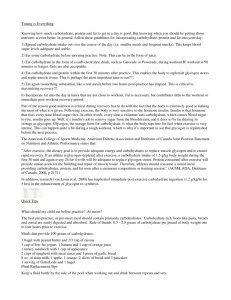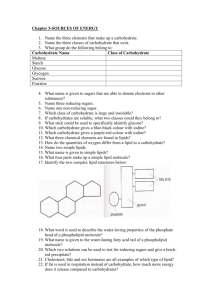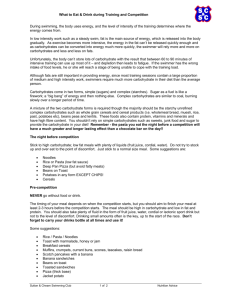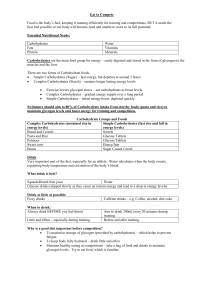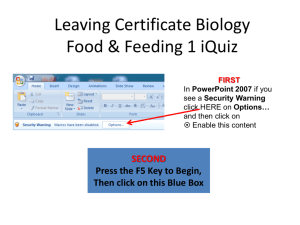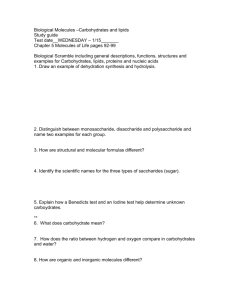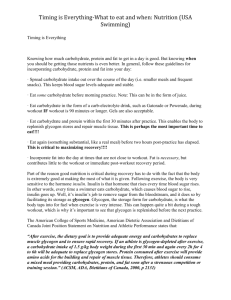No 1-How to eat & Drink like a winner ()
advertisement
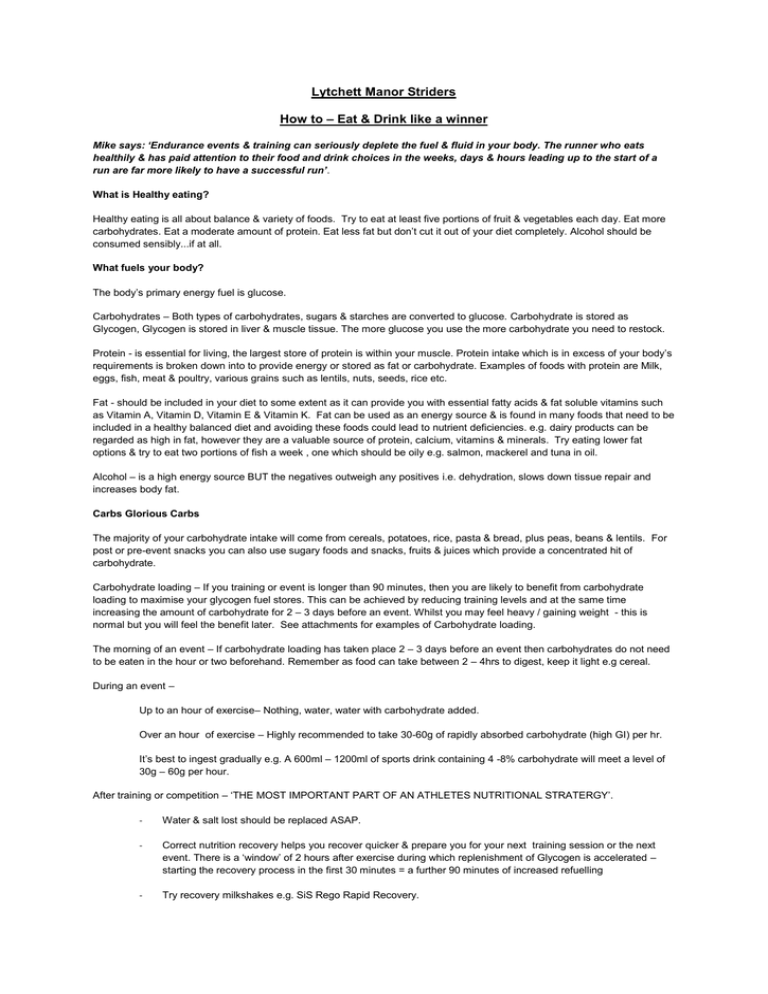
Lytchett Manor Striders How to – Eat & Drink like a winner Mike says: ‘Endurance events & training can seriously deplete the fuel & fluid in your body. The runner who eats healthily & has paid attention to their food and drink choices in the weeks, days & hours leading up to the start of a run are far more likely to have a successful run’. What is Healthy eating? Healthy eating is all about balance & variety of foods. Try to eat at least five portions of fruit & vegetables each day. Eat more carbohydrates. Eat a moderate amount of protein. Eat less fat but don’t cut it out of your diet completely. Alcohol should be consumed sensibly...if at all. What fuels your body? The body’s primary energy fuel is glucose. Carbohydrates – Both types of carbohydrates, sugars & starches are converted to glucose. Carbohydrate is stored as Glycogen, Glycogen is stored in liver & muscle tissue. The more glucose you use the more carbohydrate you need to restock. Protein - is essential for living, the largest store of protein is within your muscle. Protein intake which is in excess of your body’s requirements is broken down into to provide energy or stored as fat or carbohydrate. Examples of foods with protein are Milk, eggs, fish, meat & poultry, various grains such as lentils, nuts, seeds, rice etc. Fat - should be included in your diet to some extent as it can provide you with essential fatty acids & fat soluble vitamins such as Vitamin A, Vitamin D, Vitamin E & Vitamin K. Fat can be used as an energy source & is found in many foods that need to be included in a healthy balanced diet and avoiding these foods could lead to nutrient deficiencies. e.g. dairy products can be regarded as high in fat, however they are a valuable source of protein, calcium, vitamins & minerals. Try eating lower fat options & try to eat two portions of fish a week , one which should be oily e.g. salmon, mackerel and tuna in oil. Alcohol – is a high energy source BUT the negatives outweigh any positives i.e. dehydration, slows down tissue repair and increases body fat. Carbs Glorious Carbs The majority of your carbohydrate intake will come from cereals, potatoes, rice, pasta & bread, plus peas, beans & lentils. For post or pre-event snacks you can also use sugary foods and snacks, fruits & juices which provide a concentrated hit of carbohydrate. Carbohydrate loading – If you training or event is longer than 90 minutes, then you are likely to benefit from carbohydrate loading to maximise your glycogen fuel stores. This can be achieved by reducing training levels and at the same time increasing the amount of carbohydrate for 2 – 3 days before an event. Whilst you may feel heavy / gaining weight - this is normal but you will feel the benefit later. See attachments for examples of Carbohydrate loading. The morning of an event – If carbohydrate loading has taken place 2 – 3 days before an event then carbohydrates do not need to be eaten in the hour or two beforehand. Remember as food can take between 2 – 4hrs to digest, keep it light e.g cereal. During an event – Up to an hour of exercise– Nothing, water, water with carbohydrate added. Over an hour of exercise – Highly recommended to take 30-60g of rapidly absorbed carbohydrate (high GI) per hr. It’s best to ingest gradually e.g. A 600ml – 1200ml of sports drink containing 4 -8% carbohydrate will meet a level of 30g – 60g per hour. After training or competition – ‘THE MOST IMPORTANT PART OF AN ATHLETES NUTRITIONAL STRATERGY’. - Water & salt lost should be replaced ASAP. - Correct nutrition recovery helps you recover quicker & prepare you for your next training session or the next event. There is a ‘window’ of 2 hours after exercise during which replenishment of Glycogen is accelerated – starting the recovery process in the first 30 minutes = a further 90 minutes of increased refuelling - Try recovery milkshakes e.g. SiS Rego Rapid Recovery. Common Supplements There are a huge list of supplements & ergogenic supplements that can be beneficial as long as you do not exceed your nutrient requirements i.e. Sports drinks - Carbohydrate bars & gels - Protein bars, drinks & powders - Vitamins etc. More on Hydration ‘ Prevention is better than cure – Start off well hydrated & stay that way’ Runners should maintain hydration by drinking regularly especially with meals Before a run - drinking 400 – 600ml of fluid 2 hours before exercise will help hydrate the body. Before endurance events drink up to 300ml of fluid 10 – 15 minutes before the start to help the body absorb fluid more effectively. During an event - water or an isotonic fluid should be taken regularly – a good guide is to take something every 3 miles Use trial & error to get the right product / balance. Products designed for re-fuelling take time to get used to, see do’s & don’ts. Choices of Drinks Water- but drinking too much water can cause you problems i.e. Hyponatraemia is caused by drinking too much as your urine production is decreased during exercise, limiting the body’s ability to excrete excess fluids. Ladies please note that as you are generally smaller than men you bodily fluids get diluted quicker and you sweat less so you don’t need to drink as much. Sports drinks – for longer training runs & events sports drinks provide both carbohydrate and fluid simultaneously to help prevent fatigue. They also contain sodium to stimulate sugar & water absorption and replace the sodium lost in sweat. Caffeine - contained in commonly available beverages can enhance power output during the later stages of endurance performance. This benefit can be obtained with relatively small doses. E.g. coffee, coke, tea. The Dreaded Wall Symptoms of fatigue experienced by athletes who suffer a severe drop in energy – primarily towards the end of an event. The main cause is due to running out of glycogen – although dehydration can also cause fatigue. To avoid hitting the wall ensure your pre & during fuelling strategy provides you with a full tank of fuel (glucose) and making sure your recovery from a session is not neglected. Do’s & Don’ts Don’t drink too much alcohol the night before a race. Do start off well hydrated – but don’t leave it too late Do test different hydration & supplement products – Don’t try a new one on the day of a race Do find out what the race organisers are offering & test it. Do experiment with different foods, timing and amounts of food during training. Do take your recover nutrition ASAP after training or a race.
